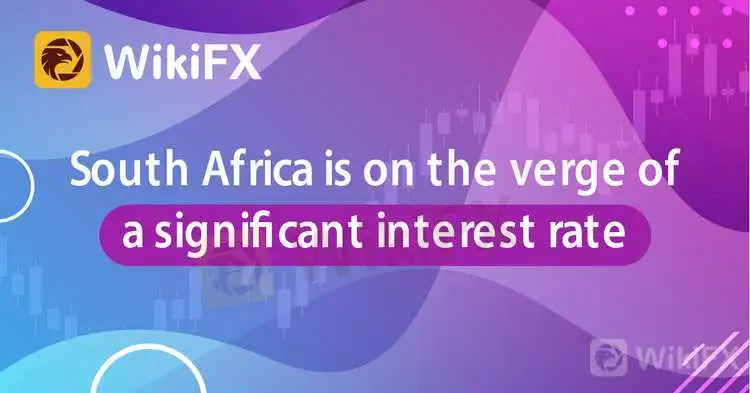简体中文
繁體中文
English
Pусский
日本語
ภาษาไทย
Tiếng Việt
Bahasa Indonesia
Español
हिन्दी
Filippiiniläinen
Français
Deutsch
Português
Türkçe
한국어
العربية
South Africa is on the verge of a significant interest rate increase.
Abstract:According to experts at the Bureau for Economic Research, South Africa is likely to witness another interest rate hike next week, albeit it may be greater than originally expected (BER).

According to experts at the Bureau for Economic Research, South Africa is likely to witness another interest rate hike next week, albeit it may be greater than originally expected (BER).
“We now expect the South African Reserve Bank (SARB) to hike the repo rate by 50bps next week, against the global backdrop of more rapid policy normalisation and, importantly, the associated recent sharp weakening of the rand exchange rate, and the sustained upside risks to domestic inflation,” the group said in a research note on Monday (9 May).
“This differs from the earlier expectation of a 25 basis point raise at the May policy meeting. The conclusion of the SARB is unlikely to be unanimous,” it stated. The estimate comes after the US Federal Reserve raised its policy rate by 50 basis points (bps) last week, the largest rise in over two decades — despite market expectations for a 75bps boost this month. In the next months, Fed chair Jerome Powell has indicated that 50 basis point hikes are anticipated at the next two meetings (June and July), with a return to 25 basis point increases in September.
The Bank of England (BoE) raised its policy interest rate by 25 basis points in the United Kingdom. The UK policy rate was raised for the fourth time in a row at this meeting. While these rate rises were expected, several other central banks shocked the market by being more hawkish than predicted.
The Reserve Bank of India raised interest rates by 40 basis points at an unexpected meeting, and the Reserve Bank of Australia raised rates by a larger-than-expected 25 basis points. Some developing market central banks, such as Poland and the Czech Republic, raised interest rates by 75 basis points, with further rises predicted next month.
Furthermore, the European Central Bank (ECB) is likely to join the rate-hiking club as soon as July, with policy rates above zero by the end of the year.
As South Africa faces higher-than-expected inflation, Jeff Schultz, senior economist at BNP Paribas South Africa, has penciled in rises.
“We expect price pressures to become more challenging by the middle of the year, where we anticipate a more protracted breach of the SARB's upper 6 percent target range again from June, where we think headline inflation will struggle to return to the SARB's 4.5 percent midpoint target until H2 2023, notwithstanding temporary fuel levy reprieve in April and May, which could see CPI temporarily slow towards 5.8 percent in the following two months,” says the report.
“We believe this will drive the SARB to accelerate rises beginning with its May MPC meeting, where we forecast 50bp raises in May and July, followed by regular, sequential 25bp hikes through May next year.”
The current heavy load shedding, according to Schultz, is unlikely to discourage the central bank from intervening to keep inflation expectations at their current 4.5 percent target. Due to outages, Eskom has warned that the country might see more than 100 days of blackouts this year.

Disclaimer:
The views in this article only represent the author's personal views, and do not constitute investment advice on this platform. This platform does not guarantee the accuracy, completeness and timeliness of the information in the article, and will not be liable for any loss caused by the use of or reliance on the information in the article.
Related broker
Read more

President of Liberland Vít Jedlička Confirms Attendance at WikiEXPO Hong Kong 2025
Vít Jedlička, President and Founder of the Free Republic of Liberland, has confirmed his participation in WikiEXPO Hong Kong 2025, one of the most influential Fintech summits in the industry. The event will bring together global leaders, innovators, and policymakers to delve into the future convergence of technology and society.

SocialFi and the Forex Market: A New Era for Decentralized Social Trading?
The worlds of social media and decentralized finance (DeFi) have converged under a new banner—SocialFi. Short for “Social Finance,” SocialFi leverages blockchain technology to reward user engagement, giving individuals direct control over their data and interactions. While SocialFi has primarily emerged in the context of content creation and crypto communities, its principles could soon revolutionize the forex market by reshaping how traders share insights and monetize social influence.

Could Japan Move Away from Ultra-Low Rates?
Japan's Interest Rate Hike: Is the Era of Ultra-Low Rates Over?

Fed Rate Cut Expectations Lowered
Federal Reserve officials have adjusted their rate cut expectations, now anticipating only one rate cut this year instead of the previously expected two.
WikiFX Broker
Latest News
Forex Market Outlook: Key Currency Pairs and Trading Strategies for March 24–28, 2025
Singapore Police Crack Down on Scams: $1.9M Seized, 25 Arrested
Gold Prices Swing Near Record Highs
XTB Opens New Dubai Office
The Growing Threat of Fake Emails and Phishing Scams
Africa Cybercrime Bust: Over 300 Arrested in Fraud Crackdown
Hong Kong Banks and Authorities Collaborate to Freeze Fraudulent Accounts Faster
SocialFi and the Forex Market: A New Era for Decentralized Social Trading?
Is Billion Bucks Fx Scam?
BaFin Halts USDe Token Issuance, Citing Serious Compliance Failures
Currency Calculator







